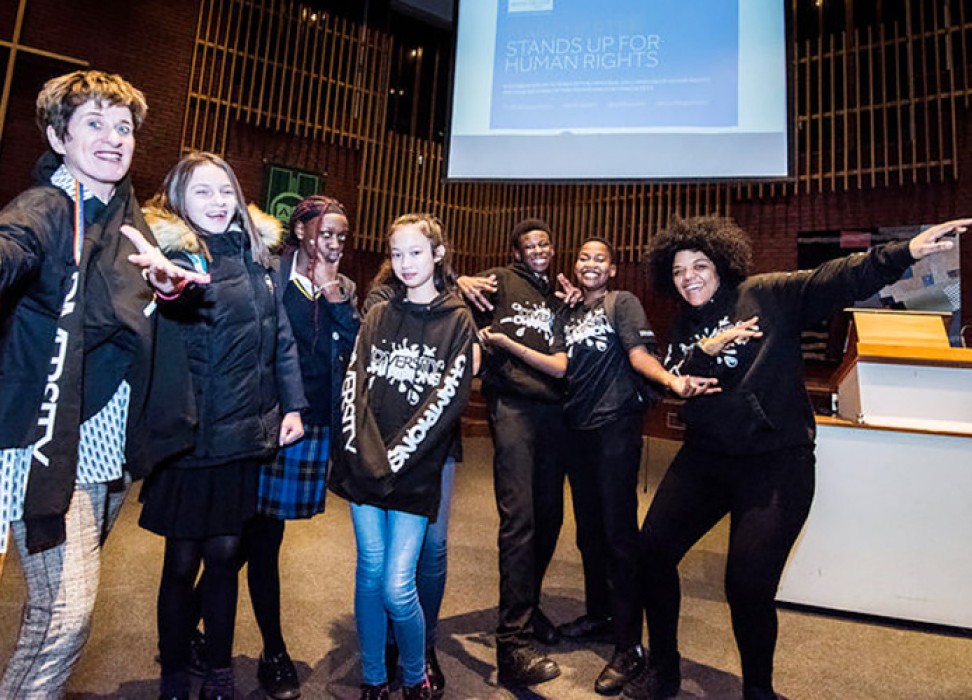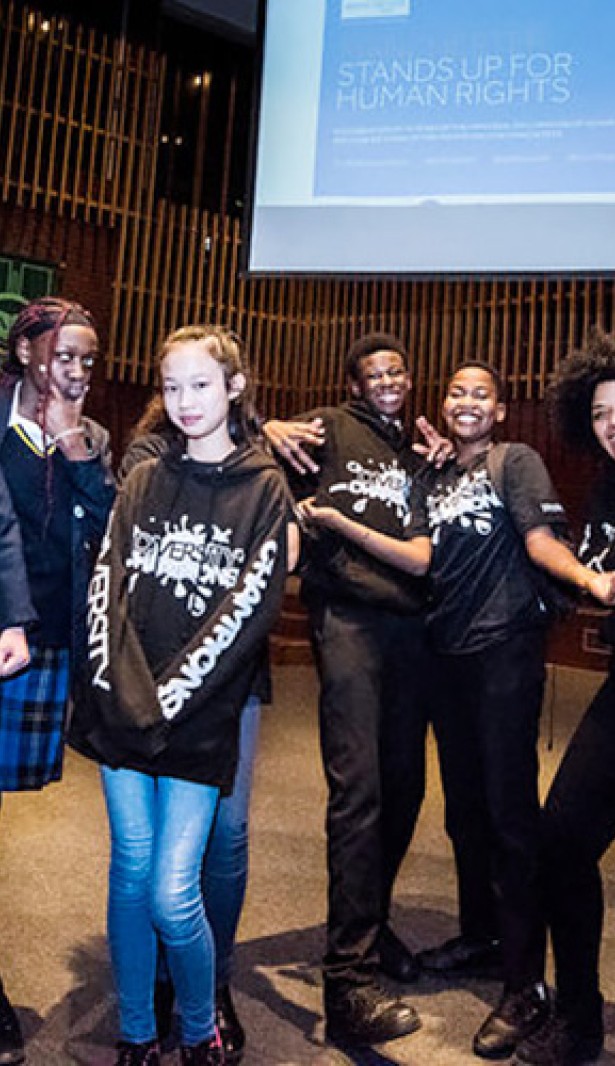Human rights to live in harmony
15 November 2018

The UN Deputy High Commissioner for Human Rights, Kate Gilmore, was in Manchester to kick-off worldwide celebrations for the 70th anniversary of the adoption of the Universal Declaration of Human Rights (UDHR) on 10 December 1948.
It was only fitting that the UN Human Rights office launched the month of celebration in Manchester, one of the world’s most diverse cities, with a series of conversations on “Our rights to live in harmony” – something that Manchester knows a lot about.
In her first conversation, Gilmore focused on the ways in which “the global changes underway including our responses to global shocks of terrorism and financial crises have brought grave consequences for our systems of governance and for the enjoyment of our rights.”
For Gilmore, the social contract between the people and government has been distorted by both hyper-securitization policies in the aftermath of 9/11 and other criminal acts of terror and by the deep austerity measures that followed the 2008 financial crisis. Those shocks and measures in response, she said, have fostered an atmosphere of distrust between and among us, including distrust in the public institutions on which democratic systems rely. The consequent rise of national and violent extremism must be challenged with a renewed political paradigm rooted in affinity, truth and hope.
“No one’s hope can be secure if rooted in the hopelessness of another. We must tell again a strong, engaging and empowering democratic story of our human connectedness – more powerful than the rising story of hatefulness,” she said. “Stories of courage in the face of adversity; of generous compassion in the face of deprivation; of embrace in the face of difference – those are the truer accounts of our communities.”
Later, at the University of Manchester, Gilmore highlighted that institution’s central role in shaping political participation by young people. Throughout history young people /students have been instrumental in political breakthroughs that have led to greater democratic inclusion and resilience: Manchester’s own Emmeline Pankhurst, Gilmore pointed out, started her activism in the suffragette movement at the age of 14.
Further, with more young people in the world today than ever before, it is time, Gilmore added, “an unprecedented now!” to accelerate inclusion of younger thinkers at decision-making tables to help find solutions that will bring deeper respect for difference, while giving greater weight to our human commonalities – more robust respect for the rights of everyone, regardless of how “we look, love or worship.”
“Human rights do not prevent our diversity – they protect it; don’t limit our diverse expression – they ensure it; don’t restrict our enjoyment of culture, belief or opinion – they guarantee it and, what’s more, human rights set out the terms and conditions under which we may exercise our rights without cost to any other person’s rights,” she added.
Hyper-securitization, Gilmore pointed out again, has done to civil and political freedoms what extreme austerity has done to economic and social rights, “forging unsustainable distance between political elites and political constituents - a distance of experience, expectation, and behaviour at a time when it is connection that we need most.”
In her third talk, Gilmore spoke with the audience about the relevance and reach of the protections and guarantees that the UDHR has offered to the world over the past seven decades. She spoke of remarkable progress in legal recognition of rights of women, of persons with disabilities, of indigenous peoples, of children, of LGBTI persons – recognitions that affirm for us all the UDHR’s core principle that “born we all are free and equal in dignity and rights”.
For Gilmore, in the face of insecurity and fear States must step up to help prevent hate and not spread it; increase people’s trust not weaken it, and create inclusive and pluralistic societies, not take measures that will worsen prospects of peace and prosperity.
“Violent extremism is the offspring of many parents – of discrimination, injustice - actual and perceived; of political disenfranchisement and economic inequality; it’s more febrile when young people are left with little but their exclusion; when a faith is met with only contempt; when an identity is deprived of dignity; when belonging is denied,” she said.
“None of this remotely excuses the contemptible acts of the violent extremist, but neither do these complex causes excuse wrongful action in response by the rest of us. We all must stand for, stand with and stand up for human rights,” Gilmore added.
The month of celebratory events sponsored by the UN Human Rights Office under the Shine your Light campaign aim “to shine a light on the many ways in which universal human rights contribute to the daily lives of people everywhere.” These events will be held in 14 cities, spanning seven time zones, each spotlighting a human rights theme relevant to that location. The next event in the series will be in Suva on 16 November.
15 November 2018

